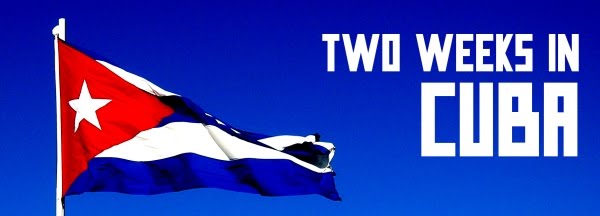The four of us sat silently in the taxi as we drove towards central Havana. The darkness inside the car and its rocky motion was enough to bring our tired bodies into a temporary form of hibernation. I felt like I should start a conversation but instead I laid my head next to the glass window and took a first glance at Cuban life.
The road was nearly free of other cars, except the odd Yank Tanks, those 1950's American cars left behind by fleeing capitalists after the Revolution, the Ladas, can-of-sardines type car made in Russia from the Cold War period and some old-fashioned motorbikes, often with side-cars. The streets were badly illuminated and, for the first time, run-down buildings and broken pavements began to appear. Large groups of people walked slowly near the road, some of them turning occasionally to the traffic trying to fetch a lift. I remember realising that, for the first time in my life, I was outside that cozy little niche known as "the developed world".
The taxi left us in calle Neptuno, between Campanario and Lealtad. The street was dark, sided by decaying tall buildings and, due to two over-loaded rubbish bins nearby, smelt of decomposition. In broken Spanish I asked an elderly couple sitting nearby if they knew were casa Ana was. Our grasp of Spanish (or more correctly, Castillan) improved marginally during our stay in Cuba to the point that we were mistaken by Argentinians. That should say something about the Argentinian accent.
Ana, a middle-aged lady with a rounded body and a remarkably juvenile face, came down the stairs to pick us up. Disturbingly, she was wearing a semi-transparent night gown. Her flat reminded me of the typical Portuguese grandmother house, with many old-fashioned mirrors and little porcelain figurines. A large TV set and a stereo stood in the middle of the living room.
Each room had two beds which we randomly assigned to Joana and Rocha (a couple) and Rui and me (the rest). Ana joked that Rui and I were a couple. That joke wasn't funny even back in Rotterdam.
Despite being sleepy and tired we pulled ourselves together and decided to go out and explore the surroundings. By this point our bodies were getting pretty sticky and the heath was almost unbearable. It would take a couple of days until our organisms adapted to the tropical atmosphere.
My first impression of Havana by night was that of a post-apocalyptic city. Rocha later compared it to post-war Berlin but without the war. Everywhere you could see a broken balcony, a cracked wall, an impressive Art Noveau building turned into a squatter house. In every corner the sound of some nearby party echoed, usually in the form of reggaeton, a hybrid resulting from the clash of reggae and hip hop, born and bread in the ghettos of the US. After a few minutes we reached the square of the Capitolio, an impressive building made to resemble the US Capitol in Washington DC and where the Cuban government used to sit until the Revolution. It is now home for the Academy of Sciences. We had some pizza and beers in a nearby place where, as far as we noticed, we were the only foreigners. When the time to pay came we had our first dilema: using Cuban pesos or convertibles? Innocently I asked the waiter which currency should we use. He chose the convertibles.
We walked in ever-growing tiredness in direction to the sea front eventually reaching the malecon. Large groups of people from all ages were sitting there breathing the refreshing air from the sea. We did the same and relaxed for a few minutes gazing at Havana's nocturnal skyline. On our way there and back we had our first interactions with the so called jineteros. Wikipedia describes them as street "jockeys," who specialize in swindling tourists. While most jineteros speak English and go out of their way to appear friendly, for example, by offering to serve as tour guides or to facilitate the purchase of cheap cigars, many are in fact professional criminals who will not hesitate to use violence in their efforts to acquire tourists' money and other valuables. The part about violence is simply not true. Jineteros are just annoying people and, with time, one learns to repel them in an almost courteous manner. I must have looked like the least Cuban of the group since all of them appeared to target me preferentially.
Back in casa Ana I promptly fell asleep, wearing only underwear, with the window wide open and under the rotating ceiling fan. Bienvenidos a La Habana!

No comments:
Post a Comment